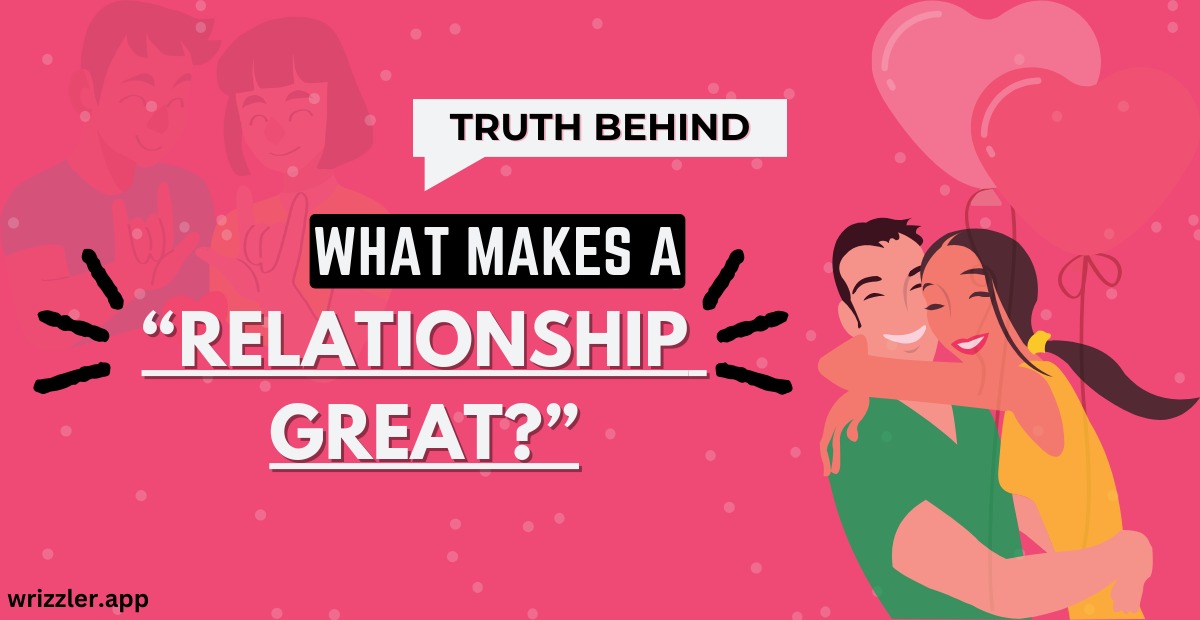I often remind couples that creating a great relationship doesn’t happen overnight. It’s like nurturing a garden—it requires time, effort, patience, and a lot of care. Every relationship has its unique dynamics, but some universal principles can guide any couple toward a stronger, deeper connection. So, if you’ve questions like what makes a relationship great or How to maintain a great relationship or What makes a relationship successful, here are some important key factors that make a relationship great. I’ve also shared real-life tips that will help you build a healthy and thriving relationship.
Factors That Make Relationships Great

1. Mutual Respect for Each Other
Respect is not just about being nice or polite; it’s about genuinely valuing each other’s individuality. Picture this: You love classical music, while your partner is all about rock. Instead of trying to change each other, learn to celebrate those differences. Mutual respect is pillar of a strong relationship so start respecting each other’s choices, thoughts, and boundaries.
For example, you may disagree on where to go on vacation, but by acknowledging your partner’s preference, you show that their opinion matters and this opens doors for a strong bond.
Tips:
- Celebrate the differences: No two people are exactly alike, and that’s what makes a relationship vibrant. Whether your partner loves a different kind of music or has an opposite approach to solving problems, it’s important to honor those differences. Relationships are about growing together, not trying to mold the other person into your image.
- Consistent appreciation and compliments: Taking the time to notice and acknowledge your partner’s efforts, even in small things, this will strengthen the bond. A simple “thank you” or “I appreciate you” can go a long way in showing respect and appreciation. Also don’t forget to give your partner compliments from time to time. You can find out some great compliments for your partner here: Best pick up lines and Compliments.
2. Honest Communication
If you’ve ever thought, “They should just know how I feel!”—let’s clear that up. No one can read minds, and that’s where honest communication comes in. Honest Communication is one of the key traits of a great relationship. Talk openly about your needs, but don’t forget the other part: listening. Real listening means giving your partner your full attention without interrupting.
For example, If you’re feeling stressed about work, don’t wait for your partner to guess. Say, “I’ve been feeling overwhelmed at work so I need some extra support right now.”
Tips:
- Be clear and direct: If something is bothering you, or if you need support, express it openly. Be specific and straightforward about what you need. For example, instead of saying “I’m fine” when you’re clearly not, be honest about how you feel.
- Practice active listening: Instead of jumping in with advice, sometimes the best thing you can do is say, “I hear you, and I understand how you feel.” Listening is an often overlooked aspect of communication. Give your partner your full attention when they are speaking, and avoid interrupting or offering solutions right away. Sometimes, just being heard is enough.
3. Trust and Transparency in the Relationships
Imagine trust like a delicate piece of glass—hard to build but easy to shatter. Trust is more than just not lying; it’s about being open, honest, and dependable. Keeping promises, even small ones, shows that you’re someone your partner can count on. This is how you can build a healthy relationship as trust is the foundation of a lasting relationship.
For Example, if you promised to attend your partner’s family dinner, follow through. Breaking small promises can chip away at trust over time.
Tips:
- Keep your promises: Whether it’s a big commitment or a small favor, following through on your promises shows that you’re dependable. When you consistently meet expectations, trust naturally grows.
- Be open and honest with your partner: Transparency is key to preventing unnecessary doubts. Be transparent. Share your feelings and thoughts openly, even when the topic is tough. Trust thrives when both partners know they can be honest without fear.
4. Emotional Support and Empathy
A great relationship isn’t just about shared laughs; it’s also about being there during the hard times. Think about it: When you’re having a rough day, do you need advice? Often, what people really need is to feel heard and supported. Having emotional support is a sign of a healthy relationship.
Real-life Situation: Imagine your partner venting about a frustrating day. Instead of jumping in with solutions, you could say, “I’m really sorry you had such a hard day. I’m here for you.” This is How you can improve your relationship.
Tips:
- Be present: Sometimes, your partner might not need advice or a solution; they just need to know you’re there for them. Offering emotional support doesn’t always require grand gestures—a simple “I’m here for you” can make a world of difference.
- Put yourself in their shoes: Empathy is about understanding your partner’s perspective—even if you don’t fully agree. It helps to think, “How would I feel if I were in their shoes?”. By seeing things from their perspective, you show that you care about their emotional well-being.
5. Physical and Emotional Intimacy
Intimacy is more than just physical affection—it’s also about emotional closeness. Sure, holding hands, hugging, and kissing are important, but sharing your dreams, fears, and vulnerabilities creates a deeper emotional bond.
For example, if you’ve had a challenging day, don’t be afraid to open up about it. Let your partner know what you’re truly feeling. This emotional intimacy helps both partners feel more connected and understood.
Tips:
- Keep the physical connection alive: Simple acts of touch like a hug when you get home or holding hands during a walk can reignite emotional closeness. Even small gestures of physical intimacy can reaffirm the emotional bond between partners.
- Have emotional intimacy: Being vulnerable with your partner and sharing your true thoughts, dreams, and fears creates a strong emotional connection. This level of openness can make both partners feel understood and valued.
6. Compromise and Flexibility for Navigating Challenges
Every couple faces disagreements—it’s part of life. But how you handle these moments makes all the difference. A successful relationship doesn’t mean avoiding conflict but finding ways to meet in the middle.
Real-life Situation: Let’s say one of you wants to spend Saturday with friends, while the other prefers a quiet day at home. Instead of arguing, find a compromise like spending half the day with friends and the other half relaxing together.
Tips:
- Meet halfway: When conflicts arise, rather than insisting on getting your way, try to find a solution that works for both of you. Relationships are built on give-and-take, and finding common ground is essential.
- Stay adaptable: Life is full of surprises, and a great relationship requires both partners to be flexible in adapting to new circumstances. Whether it’s adjusting to a new job or moving to a new city, being adaptable helps the relationship grow in a healthy way.
7. Independence and Space
While spending time together is important, giving each other room to grow individually is essential too. A healthy relationship is one where both partners can pursue their own passions and interests this is how to strengthen your relationship.
For example, your partner might love painting while you enjoy playing guitar. Give each other the space to pursue those passions, and you’ll find that it brings you closer when you come back together.
Tips:
- Encourage personal growth: Allow your partner the freedom to pursue their hobbies, interests, and goals. Supporting their independence shows that you trust and respect them and it is a quality of a great relationship. It also helps both partners bring their best selves to the relationship.
- Respect personal space: Everyone needs time to themselves, whether it’s to recharge or simply enjoy solitude. Respecting your partner’s need for personal space can prevent feelings of suffocation and promote a healthy balance between independence and togetherness.
8. Humor and Playfulness
Laughter is really one of the best ways to strengthen a relationship. Couples who joke and play together tend to feel more connected and enjoy each other’s company. Not everything needs to be serious!
Real-life Situation: If a situation feels tense, try adding a little humor to ease the mood. A shared laugh can dissolve tension and remind you both that you’re on the same team.
Tips:
- Don’t take everything too seriously: Playful teasing, sharing inside jokes, or engaging in fun activities together can bring joy to even the most mundane days. Humor helps keep things exciting and fresh in long-term relationships.
- Use humor to diffuse tension: In moments of conflict, a little light-hearted humor can go a long way. Bring lightheartedness into daily interactions—whether it’s a funny meme, inside joke, or playful teasing. It keeps the relationship fresh and fun. You can check out this article for understanding the research-backed benefits of healthy relationships.
9. Commitment and Dedication of Moving Forward
A strong relationship is built on commitment, especially during tough times. It’s easy to stay connected when things are going well, but true commitment means sticking it out when life gets challenging. Both partners need to be dedicated for growing together and working through difficulties this is one of the traits of a successful romantic relationship.
For example, during a difficult phase, maybe one of you lost a job or there’s family stress. Staying committed to the relationship means offering support, being patient, and working through these moments together.
Tips:
- Set goals together: Whether it’s planning for the future or overcoming current challenges, a shared vision strengthens your bond.
- Grow together: Relationships evolve over time, and a strong partnership involves growing together as you navigate different life stages. Whether it’s learning new things about each other or setting future goals, staying committed to growth strengthens the bond.
- Stick through the challenges: No relationship is without difficulties. What makes a relationship great is the ability to work through challenges, communicate openly, and remain committed even when things get tough.
Conclusion
A great relationship doesn’t just happen—it’s built day by day, with consistent effort, communication, and love. By nurturing mutual respect, trust, empathy, and intimacy, you and your partner can create a relationship that not only survives but thrives.
Remember, the journey of love is one of growth. So keep supporting, communicating, and laughing together, and you’ll build a bond that lasts for years to come.
By following these tips, you can grow a meaningful, lasting relationship filled with love, respect, and joy.
FAQs:
What makes a relationship great?
Mutual respect, open communication, trust, empathy, and shared commitment are key to a great relationship.
How do you build trust in a relationship?
Trust is built through honesty, consistency, and transparency. Keep promises and be open with your partner.
Why is compromise important in relationships?
Compromise helps couples navigate differences, ensuring both partners feel heard and valued.
How can humor improve a relationship?
Laughter lightens the mood, reduces tension, and keeps the relationship enjoyable, even during tough times.
How do you maintain intimacy in long-term relationships?
Regular physical affection, emotional openness, and quality time together are key to maintaining intimacy.

